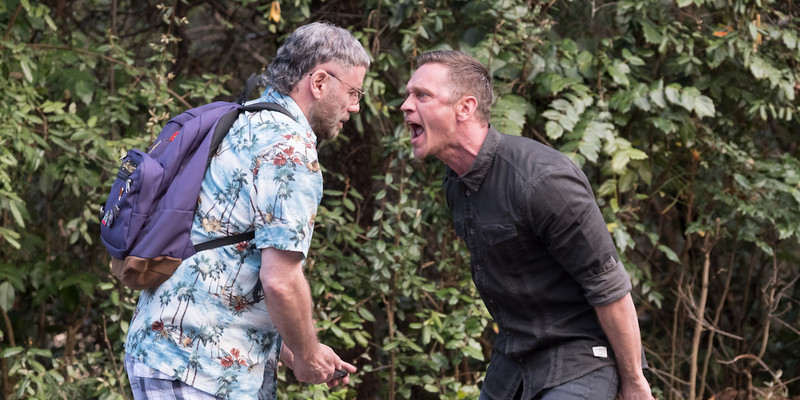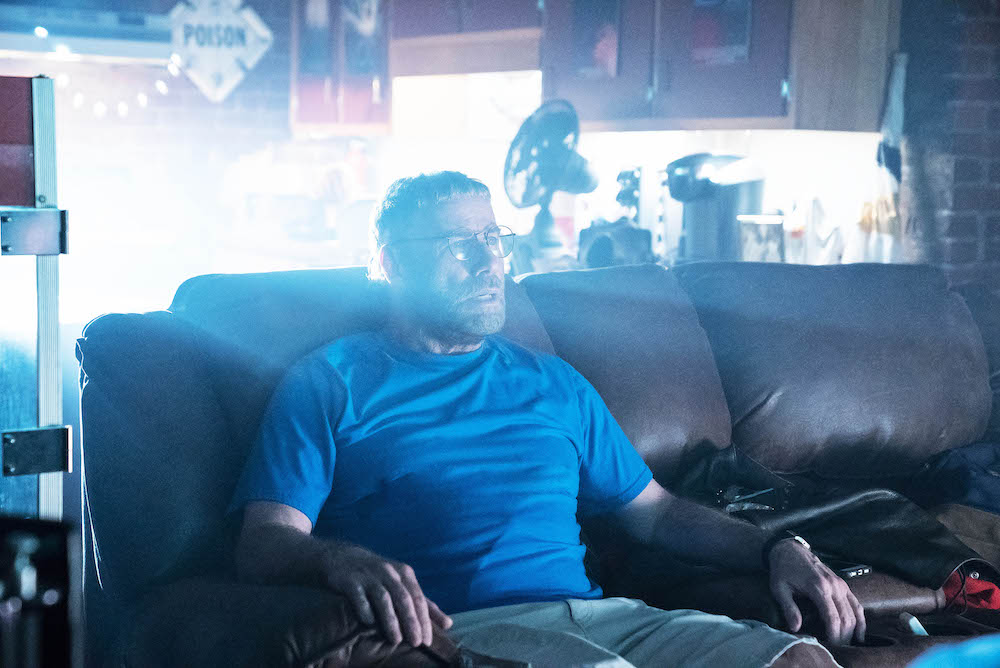John Travolta is on the other side of the autograph pen in Fred Durst’s new horror movie, “The Fanatic,” which contrasts the fantasy of celebrity with the harsh reality of human behavior pushed to a breaking point. Travolta plays a desperately awkward horror super-fan named Moose, who trudges around Los Angeles with decades of horror movies playing in his head. One of his favorite actors is Hunter Dunbar (Devon Sawa), who does not take kindly to Moose’s initial pushiness during an autograph event, and later outside the star’s home. When Dunbar decides to aggressively sign Moose’s Hawaiian shirt like a knife scarring his chest, the fan doesn’t take it as a means to give Hunter some space, but to make the star his friend.
Durst’s original screenplay (co-written with Dave Bekerman), gives Travolta a role that’s unlike how we’ve seen him before, starting with the mullet that sits atop Moose’s head, complemented by slumped shoulders and a tightly strapped purple backpack. It’s a distinct physical presence for an equally berserk emotional performance, which has an anxious Travolta winding himself up in any environment that Moose is in, unable to make eye contact. With Travolta having stayed in character throughout the filmmaking process, he fashions Moose as a gentle monster who is unaware of his capacity for violence, and is only able to connect with others when extolling the artifices of Hollywood.
RogerEbert.com sat down with Travolta to discuss him staying in character throughout the making of “The Fanatic,” the difference between a good person and a bad celebrity, the rap performance that didn’t make final cut and more.
Within your career, I think this is the meekest and most awkward we’ve ever seen you.
Probably, yes. [laughs]
Did that mean this was an especially big challenge for you?
Not really. I look at myself more as a character actor, so it gave me more to do. I grew up with that in mind, where I’m a little more comfortable with, what is this character, how is he different? What kind of creative aspects can you contribute? Because it’s a visual medium. His physicality, his tics, his idiosyncratic behavior, is really important. And also I put him slightly on the spectrum so that he could justify the things that he did, innocently, as opposed to evilly intended. So that was fun to play with, because I could do everything guilelessly. Where, if he were psychotic, then I couldn’t do that. I wanted him to innocently jump off the cliff, you know?

When it comes to the script, did you ever have to pull Moose back? Or the opposite, did you have to expand on him?
I think expand. The script demanded extreme behavior and actions, like with the maid let’s say, or tying [Hunter Dunbar] up. [Moose] has to go somewhere, where he’s so deeply hurt by the person that he loves the most, doesn’t love him back. What do you do? Confusion, overwhelmed, discombobulation. And that allows bigger than life behavior, so I probably … there’s remorse too—he does something, and feels bad about it; he does something, and feels bad about it. But you know, maybe the movie star doesn’t understand where I’m coming from, so therefore, I will write a letter and explain exactly that. So, he’s tragically and beautifully attempting to make this situation go right. And this poor movie star is a good person but a bad celebrity—he’s decent with his son, he’s decent with his ex, he’s even regretful with the maid, all the stuff—but he’s not good when it comes to that.
And I figured out, maybe one of the reasons was, whether he played it this way or not, is that, there are professional fans, and there are real fans. My character looks like a professional fan—‘You sign this, I’ll sell it for more’—and he’s not, he’s going to have that until the day he dies. He’ll be buried with it. The film star probably thinks, this guy is just trying to make money off me, and he’s invading my privacy to do so. So, he’s justified to some degree, but he doesn’t even call the police, he just wants to macho it and bully him. But my guy has been bullied his whole life—the person I love wants to bully me too? What? So he gets all sorts of confusions.
You have your “Pagliacci” moments in “The Fanatic” where you’re playing Moose, attempting to make money by pretending outside the Grauman’s Chinese Theater to be a movie version of a bobby. It’s ridiculous, and sad. What’s behind those scenes, for you?
What’s behind that … [Moose] for some reason maybe saw “Mary Poppins,” and thought that the Dick Van Dyke way of doing cockney was the best way. And his thinking that people would think that would be fun in Hollywood to take a picture with, and it’s like the last … and the irony and the tragedy with the end [of “The Fanatic”], it’s the real thing but others think that it’s fake. It’s a tragedy, utterly and ironically. So, it was meant to be what it was meant to be, this guy’s thought process on what people will want is a more innocent fantasy of what they would want. He really thinks that’s a good accent. Ello!

Was that scary for you to perform that, given how hammy and vulnerable it is for Moose?
I was in character and I loved it. Because I thought, if you own it, if you really believe what your character is doing and is committed to it, you can’t make a mistake with it. You have to go to that zone. And Fred [Durst] was brilliant, by the way, at allowing improvisation to get me there. He’d say, ‘Hey, Moose. How are you doing today?’ I’d go [frantically] ‘Good how are you doing,’ and of course the character doesn’t look at people really much. Whatever came up, and [Fred Durst] would know when I was revved up. Or I’d go, ‘How do you like this, Fred? How do you like this accent?’ And I’d go into a British accent, and he’d say, ‘Oh, that’s good, Moose. You should really go out there and kill today.’ And I would go to each of the departments because the crew was falling in love with Moose, they were really getting it. So, I would talk to lighting and props, and they would talk to Moose. They didn’t want JT, they wanted Moose. So I had this group agreement on Moose being the guy to play with that day, so the scenes came kind of fun, and I looked forward to them.
So you were in character on set …
Yes.
Throughout the entire process?
Mostly during the filming process, before and after, just to stay in the zone. But it wasn’t taxing people to do it. They were helping. And they liked helping, because they liked helping Moose, and they couldn’t wait to see what he was going to be up to that day. And some people were more familiar with the script than others, so the one’s that were, I did this whole bit where he’s alone in the house, I decided that Moose’s favorite song was the rapper song [LL Cool J’s “I Need Love”]. And Fred just loved it. But, Moose was going, ‘When I’m alone in my room, sometimes I stare at the walls, and in the back of my mind …’ and Fred was like ‘Oh, no,’ and I just danced around and we had it in the movie and we called and it just wasn’t feasible. But there’s a lot of special moments that we didn’t get to use, all of it extended from everyone allowing me to do that. And Moose feeling free to express himself in private, and with others. And also the inhibitions and the scary moments.
But you know, there was this idea that that he feels he has to tie this guy up to prove to him, ‘You’re gonna finally listen to how much I love you, and how much I know about horror movies, and how good an actor I am. Watch me do Freddy.’ And I had more [than was in the film], I had “Misery,” smashing his legs and going, ‘Oh, Paul!’ And we had to hone it down, because my feeling was that it’s showtime to prove to the movie star, that I can do what he does, but he can see how much I love him, but even if I have to read the letter to him, all of this was an opportunity to say, ‘You got me wrong, man.’ And I said, ‘Fred, let me lay in bed,’ and he said, ‘Ok.’ When [Hunter] got me excited about the milkshakes and going to Musso and Frank’s, I just felt like I had to get in there. And then there’s this moment of horror, where he’s in a better state, he’s achieved what he wanted from this guy, but now the reality hits of, ‘What have I done to him? I’m going to get in trouble for this.’ Boom. I don’t feel so good about this. All that was so tragic to play.
Had you done that kind of approach before, of being in character?
The ones that had extreme behavior. Like Edna in “Hairspray,” or Robert Shapiro in “American Crime Story.” Those were the roles where I felt like I had to do more warm-up to get into the zone of the character. A little bit with “Pulp Fiction,” because I made the decision of playing the high throughout the movie. And there’s a trend to that head set, where it moves to being sober but on a curve. Certain films demand more of leading up to the zone than others do. I did “In the Valley of Violence,” that character, he was an old, crotchety marshal from 1850 or whatever the hell it was. So, the one’s that were more extreme in their behavior, were the ones that needed a little more warm-up time. And perhaps, for me, improv … all you have to do to get an actor ready is to ask them questions about them.

About the character?
Yes. It works all the time. I’ve never seen a better technique in all these years of acting, since I was 12 years old. That seems to be the most effective way. So, how do you feel about mom, how do you feel about dad, what did you do today? All those things are really mundane questions, but if you’re thinking, and even if you haven’t discovered that character yet, you’re finding what that character thinks. And isn’t that a marvelous thing to start to build. I did that with “Saturday Night Fever,” I had a coach who sat me in a dark room with the lights off and said, ‘So, tell me something about yourself, Tony. How do you feel about dancing, how do you feel about your mother?’ And I found out more than just the script, I found out how he thought about things, and I could add that to the performance at designated moments that were really a beautiful way to go into a performance confidently. And it’s so much about your confidence. I think if you’re really confident in how you’re portraying something, that’s automatically contagious to the audience.
And the inverse—do you feel that audience’s can see through character work that’s not confident?
Yes. And it’s all about that—and when you attack it full-bodily, they want that. The audience is very intuitive, and they really know when you’re on it, and when you’re really there giving them something thought-out. It’s along those lines, I think.
One movie of yours that’s getting its 25th anniversary next year, but is not talked about as much at the moment but I’m sure will be, is Desmond Nakano’s “White Man’s Burden.”
Oh my gosh, yes.
Do you feel that movie was ahead of its time in the conversation, looking back on it now?
Completely! Absolutely. That movie seemed so natural to me, and maybe it felt obvious to me to switch the roles; it seemed as a valid thing to do at any time; not just 1994 but really any time was OK. And I did that right after “Pulp Fiction,” you realize. And that was because Quentin [Tarantino] actually encouraged me to do that, and “Get Shorty.” Now, of course, “White Man’s Burden” was a little harder to pull off because the budget was so small, and we were trying to make such a big statement. Maybe it was a little out of its timing.
It’s hard to find copies of it.
It was such a tiny thing, one of those obscure films that has remained obscure for all sorts of reasons, you know?

“The Fanatic” of course reminded me of you, in a lot of ways. It’s about boundaries, especially as being a familiar face, and controlling those boundaries. How has that concept changed for you with your year-old Instagram account?
I’ve really enjoyed the last year on Instagram, utterly enjoyed it. Because it gives me license to communicate what I feel like communicating, but only when it’s interesting to me, or when I feel it might be interesting to them. And it’s worked, because of that. I won’t post for days because I don’t really feel anything interesting might have happened that I’d want to share. I don’t want to take a picture of a meal.
Cockpit? Yes. Meal? No.
Or a flower setting [laughs]. Of course I’ve done my research, and I’ve looked at other major people’s sites, and they’re not really sharing anything of themselves. It’s really the objects and the passing on thoughts of the day, and it’s all fine, but what’s the purpose, then? There’s a bit of communication, but there’s no sharing of one’s own life perspective. And I don’t mind that, because I’m doing it selectively. And I find it fun to watch, too. It’s like, “Ooh, maybe I’ll take this car 100 miles per hour, see what that feels like. Maybe they’d like to see me do that.” I’ll lip sync this song.
So you approach it as an entertainer as well.
Yeah. I do feel … I let my son direct his first film. And I thought it was hilarious, and everybody said, “Oh, no, no. You can’t do that.” You’d solicit some opinions and they’d say, ‘Oh, no.’ But I said, ‘It’s funny, and it’s really clever.’ I said, ‘I’m going to post it.’ And boom, I was right! It was so silly. You create without being hired to do it.
And like you said, there’s a difference between a good celebrity and a good actor.
There is a difference.
Is it hard to learn the difference when you are deep within Hollywood?
Ahh—if you are long enough not a celebrity, like I became at 21 … I had all those years where I learned from, and I was in the mix of all these famous people because we’re in show business and our family’s in show business, but I felt like I learned from how I felt, observing with others. I think I was very well versed by the time that I became famous, that I felt, I’m not going to do what so-and-so did. But I do like how so-and-so … I think I can conform it to the effect that I want to make.












